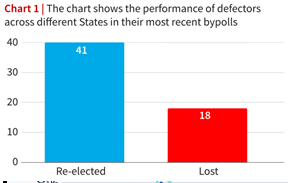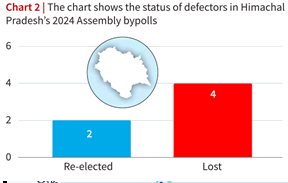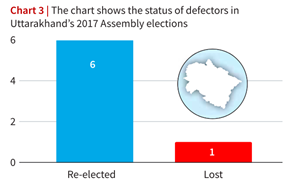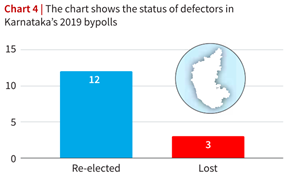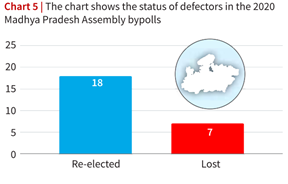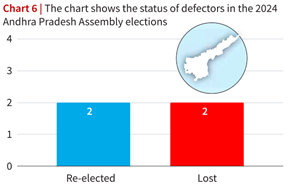NEED OF REVIEWING ANTI DEFECTION PROVISIONS
Relevance: GS 2 – Parliament and State legislatures—structure, functioning, conduct of business, powers & privileges and issues arising out of these
Why in the News?
- In 2024, five Bharat Rashtra Samithi (BRS) MLAs who won the Telangana Assembly elections in 2023 defected to the Congress.
- Many defectors not only won in subsequent elections but also received ministerial berths.
- 89% of party-hopping defectors were fielded again.
- 70% of these defectors were re-elected.
More about the News
- Telangana is the latest State where defections have taken place.
- Frequent defections have raised questions about the effectiveness of the anti-defection law.
- Data from the past 10 years show many politicians disqualified under the anti-defection law were re-elected from the party they defected to in subsequent by-polls.
Defections in Various States: Analysis of 66 MLAs
- States included: Andhra Pradesh, Himachal Pradesh, Uttarakhand, Karnataka, Madhya Pradesh, and Manipur.
- Of the 66 defectors, 59 (89%) were fielded again in subsequent polls by the parties they joined.
- Among the 59, the re-election rate was 70%, indicating a high success rate for defectors.
- Himachal Pradesh
- Six Congress MLAs cross-voted in the Rajya Sabha elections and were disqualified.
- They were all fielded by the BJP in the subsequent polls.
- Four of them lost (Chart 2).
- Uttarakhand (2016)
- Nine Congress MLAs shifted to the BJP, leading to a political crisis.
- These MLAs were disqualified in April 2016.
- Seven were fielded again in the 2017 Assembly elections; six won (Chart 3).
- Among the defectors, three became ministers.
- Karnataka (2019)
- The defection of 17 MLAs, mostly from Congress and Janata Dal (Secular), led to the collapse of the Kumaraswamy government.
- The BJP came to power with B.S. Yediyurappa as Chief Minister.
- Fifteen defectors were fielded again as BJP candidates in the by-polls, and 80% were re-elected (Chart 4).
- Twelve re-elected defectors were given ministerial berths, seven of whom were ministers in the previous Kumaraswamy ministry.
- Madhya Pradesh (2020)
- 22 MLAs defected, reducing Congress to a minority after Jyotiraditya Scindia joined the BJP.
- Three more Congress MLAs resigned and joined the BJP later.
- The BJP fielded all 25 defectors in the subsequent by-polls; 72% were re-elected (Chart 5).
- 13 re-elected defectors were inducted into the Shivraj Singh Chouhan ministry; seven were ministers before defection.
- Andhra Pradesh
- Eight MLAs (four each from TDP and YSRCP) were disqualified for changing allegiance.
- Two from each party were fielded again.
- Defectors contesting on the YSRCP ticket lost, while those on the TDP ticket won, making the win ratio 50% (Chart 6).
- Manipur (2017)
- Thounaojam Shyamkumar, elected on a Congress ticket, switched to the BJP before the oath-taking ceremony.
- He was made a minister in the N. Biren Singh government and was disqualified in 2020.
- He won the subsequent by-election.
Issues with the Current Anti-Defection Law
- Undermines Representative Democracy: The law forces MPs/MLAs to blindly follow party directions without freedom to vote their own judgment, undermining the principles of representative democracy.
- Weakens Legislative Oversight: The law makes members vote based on party decisions rather than their constituents’ interests, weakening the legislature’s oversight functions over the government.
- Breaks Link Between Legislator and Electorate: The law breaks the link between the elected legislator and their electorate by prioritizing party loyalty over responsiveness to voters.
- Unconstitutional Role of Speaker: The law allows the Speaker, whose tenure relies on the party’s majority, to decide on disqualification, which is unconstitutional according to the Supreme Court.
- Lack of Independent Mechanism: The law lacks an independent mechanism to decide on defection cases swiftly and impartially.
- Encourages Political Instability: The law’s exceptions for party splits and mergers have been exploited to engineer defections and topple governments, undermining political stability.
Way forward to Anti Defection Law
- Review Anti-Defection Law: Maharashtra Legislative Assembly Speaker Rahul Narvekar will head a committee to review the anti-defection law, with the aim of addressing its flaws and ensuring it functions as intended to maintain political stability while safeguarding representative democracy.
- Restrict the Law’s Scope: Limit the anti-defection law to only those votes that determine the stability of the government, such as no-confidence motions and budget votes, as suggested by several experts.
- Transfer Decision-Making Power: Transfer the power to decide on disqualification to an independent external mechanism, such as a permanent tribunal headed by a retired Supreme Court or High Court judge, as recommended by the Supreme Court.
- Strengthen Intra-Party Democracy: Encourage intra-party democracy to enable discussion among members and prevent dictatorship within the party, as suggested by the 170th Law Commission Report.
- Merge Pre-Poll Electoral Fronts: Merge pre-poll electoral fronts as one party under the 10th Schedule, as recommended by the 170th Law Commission Report.
- Disqualify Only for Voluntary Defection: Disqualify members only for giving up party membership voluntarily or voting/abstaining against party directions, as recommended by the Dinesh Goswami Committee.
- Provide a Timeframe for Decision: Establish a timeframe within which the presiding officer must decide on disqualification cases, as suggested by several court rulings.
- Ensure Transparency and Accountability: Implement transparent and accountable directives for the correct functioning of the 10th Schedule, ensuring that the law does not undermine representative democracy or parliamentary deliberations.
- Address Speaker’s Role: Address the concerns about the Speaker’s impartiality in deciding defection cases by ensuring that the Speaker’s decisions are subject to judicial review and that the process is fair and timely.
Alternative articles
https://universalinstitutions.com/anti-defection-law/
Source: The Hindu
Mains question
Discuss the implications of frequent political defections on democratic stability and governance in India. Give the Answer with reference to recent trends and the effectiveness of the anti-defection law. (250 words)

